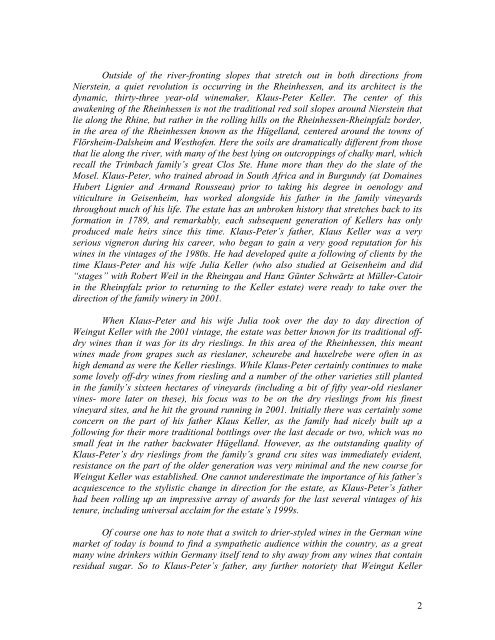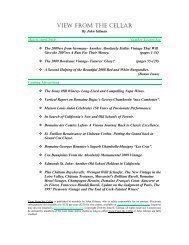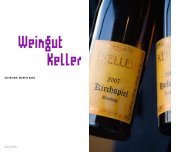View From The Cellar Sept-Oct 2007 - Keller Wein
View From The Cellar Sept-Oct 2007 - Keller Wein
View From The Cellar Sept-Oct 2007 - Keller Wein
Create successful ePaper yourself
Turn your PDF publications into a flip-book with our unique Google optimized e-Paper software.
Outside of the river-fronting slopes that stretch out in both directions from<br />
Nierstein, a quiet revolution is occurring in the Rheinhessen, and its architect is the<br />
dynamic, thirty-three year-old winemaker, Klaus-Peter <strong>Keller</strong>. <strong>The</strong> center of this<br />
awakening of the Rheinhessen is not the traditional red soil slopes around Nierstein that<br />
lie along the Rhine, but rather in the rolling hills on the Rheinhessen-Rheinpfalz border,<br />
in the area of the Rheinhessen known as the Hügelland, centered around the towns of<br />
Flörsheim-Dalsheim and Westhofen. Here the soils are dramatically different from those<br />
that lie along the river, with many of the best lying on outcroppings of chalky marl, which<br />
recall the Trimbach family’s great Clos Ste. Hune more than they do the slate of the<br />
Mosel. Klaus-Peter, who trained abroad in South Africa and in Burgundy (at Domaines<br />
Hubert Lignier and Armand Rousseau) prior to taking his degree in oenology and<br />
viticulture in Geisenheim, has worked alongside his father in the family vineyards<br />
throughout much of his life. <strong>The</strong> estate has an unbroken history that stretches back to its<br />
formation in 1789, and remarkably, each subsequent generation of <strong>Keller</strong>s has only<br />
produced male heirs since this time. Klaus-Peter’s father, Klaus <strong>Keller</strong> was a very<br />
serious vigneron during his career, who began to gain a very good reputation for his<br />
wines in the vintages of the 1980s. He had developed quite a following of clients by the<br />
time Klaus-Peter and his wife Julia <strong>Keller</strong> (who also studied at Geisenheim and did<br />
“stages” with Robert Weil in the Rheingau and Hanz Günter Schwärtz at Müller-Catoir<br />
in the Rheinpfalz prior to returning to the <strong>Keller</strong> estate) were ready to take over the<br />
direction of the family winery in 2001.<br />
When Klaus-Peter and his wife Julia took over the day to day direction of<br />
<strong>Wein</strong>gut <strong>Keller</strong> with the 2001 vintage, the estate was better known for its traditional offdry<br />
wines than it was for its dry rieslings. In this area of the Rheinhessen, this meant<br />
wines made from grapes such as rieslaner, scheurebe and huxelrebe were often in as<br />
high demand as were the <strong>Keller</strong> rieslings. While Klaus-Peter certainly continues to make<br />
some lovely off-dry wines from riesling and a number of the other varieties still planted<br />
in the family’s sixteen hectares of vineyards (including a bit of fifty year-old rieslaner<br />
vines- more later on these), his focus was to be on the dry rieslings from his finest<br />
vineyard sites, and he hit the ground running in 2001. Initially there was certainly some<br />
concern on the part of his father Klaus <strong>Keller</strong>, as the family had nicely built up a<br />
following for their more traditional bottlings over the last decade or two, which was no<br />
small feat in the rather backwater Hügelland. However, as the outstanding quality of<br />
Klaus-Peter’s dry rieslings from the family’s grand cru sites was immediately evident,<br />
resistance on the part of the older generation was very minimal and the new course for<br />
<strong>Wein</strong>gut <strong>Keller</strong> was established. One cannot underestimate the importance of his father’s<br />
acquiescence to the stylistic change in direction for the estate, as Klaus-Peter’s father<br />
had been rolling up an impressive array of awards for the last several vintages of his<br />
tenure, including universal acclaim for the estate’s 1999s.<br />
Of course one has to note that a switch to drier-styled wines in the German wine<br />
market of today is bound to find a sympathetic audience within the country, as a great<br />
many wine drinkers within Germany itself tend to shy away from any wines that contain<br />
residual sugar. So to Klaus-Peter’s father, any further notoriety that <strong>Wein</strong>gut <strong>Keller</strong><br />
2




